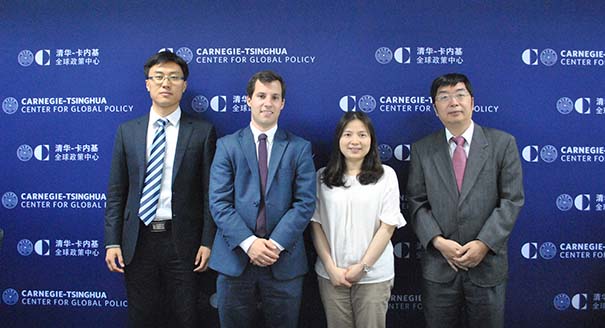Registration
You will receive an email confirming your registration.
As sectors such as finance and defense become digitally integrated, cyberspace has emerged as a domain in which security and prosperity are closely linked in complex ways. China and the United States both have highly sophisticated cyber capabilities, and these two countries will have a sizable impact on how the international community treats both the security and economic dimensions of cybersecurity challenges. A clear understanding of the risks that cyber activities can pose and of the best ways to mitigate those risks is needed to foster a stable, flourishing strategic environment in which states engage constructively with one another.
To assess the strategic and commercial implications of how states interact in cyberspace and how to optimize these interactions, Carnegie-Tsinghua’s Tong Zhao moderated a discussion with leading Chinese and U.S. experts. They talked about how cyber capabilities have evolved in recent years, the security as well as economic costs and benefits associated with states’ cyber conduct, and what bilateral and multilateral initiatives can do to encourage states to behave responsibly in this ever-changing digital age.
Discussion Highlights
- A new form of aggression: Panelists asserted that cyber operations have introduced a new component to international relations, beyond the scope of traditional diplomatic or military relations. As such, experts contend it has also brought about the added potential for aggression that falls somewhere between economic sanctions and conventional warfare. State-sponsored cyber attacks, they warned, can escalate given the lack of clarity on cybersecurity norms and the applicability of existing international laws.
- Disagreement on common norms: Speakers highlighted the necessity of articulating mutually agreed upon international cybersecurity norms before international laws concerning cybersecurity issues can be established. However, the relative newness of cybersecurity issues, along with differing cultural understandings on Internet freedom and the right to access information, present obstacles to the establishing such laws. In particular, while China and the United States have agreed on UN norms on cybersecurity, they continue to disagree on Internet use governance (xinxi anquan).
- Applicability of existing international law: One of the first questions posed by the experts was whether or not existing international laws could be applied to cybersecurity issues. The United Nations Group of Governmental Experts (UNGGE) released a 2013 report affirming that international law indeed applies to cybersecurity and cyberspace. But panelists contend the report was unclear about how these laws will be applied in the context of cybersecurity. In 2015, the United States and China took a bilateral step toward applying these laws by signing an agreement to prevent international property theft within their borders.
- State-sponsored incursions vs. “hacktivism”: The panelists agreed that while the source of cyber theft is critical to identify, it can be difficult to ascertain whether an act of cyber aggression is committed by a state-sponsored actor or by an independent organization or individual. Both state-sponsored and state-condoned cyber attacks have serious implications for international diplomacy. The 2015 UNGGE consensus report aimed to establish the norm that states should not knowingly allow their territory to be used for internationally wrongful acts. But experts said there is little consensus on how actors should cooperate across borders to prevent independent cyber attacks.
- Room for greater cooperation: Given the rapid development of technology and the growing volume of cyber attacks on public and private systems, panelists said there is ample room for greater international cooperation on cybersecurity issues. Given the newness of cybersecurity in international relations, technological advancement frequently outpaces the creation of international law.
Tong Zhao
Tong Zhao is an associate in Carnegie’s Nuclear Policy Program based at the Carnegie–Tsinghua Center for Global Policy.
Li Bin
Li Bin is a senior associate working jointly in the Nuclear Policy Program and the Asia Program at the Carnegie Endowment for International Peace.
Tim Maurer
Tim Maurer is an associate at the Carnegie Endowment for International Peace, focusing on cyberspace and international affairs.
Tang Lan
Tang Lan is the deputy director of the Institute of Information and Societal Development at the China Institutes of Contemporary International Relations.
